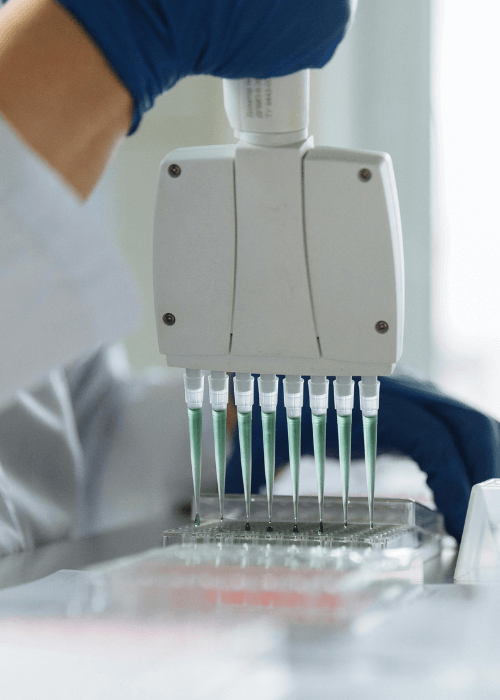PGT-A and PGD Services
Preimplantation Genetic Testing (PGT), which includes PGT-A (Preimplantation Genetic Testing for Aneuploidies) and PGD (Preimplantation Genetic Diagnosis), has revolutionized the way fertility treatments are approached. These advanced genetic screening techniques are designed to ensure that only healthy embryos are used for implantation, significantly increasing the chances of a successful pregnancy and reducing the risk of passing on genetic disorders.
At Bud IVF, we bring together advanced technology, expertise, and personalized care to provide the best outcomes for our patients undergoing PGT-A and PGD. Our state-of-the-art embryology lab is equipped with cutting-edge tools, ensuring precise genetic testing and reliable results. Led by a team of highly skilled embryologists and fertility specialists, we carefully analyze each embryo to maximize the chances of a healthy pregnancy.
What is PGT-A?
PGT-A is a genetic screening method that evaluates embryos for chromosomal abnormalities such as missing or extra chromosomes. These abnormalities, also known as aneuploidies, are one of the leading causes of failed IVF cycles, miscarriages, and developmental issues in children. These advanced genetic screening techniques are designed to ensure that only healthy embryos are used for implantation, significantly increasing the chances of a successful pregnancy and reducing the risk of passing on genetic disorders.
By identifying chromosomally normal embryos, PGT-A improves implantation rates, reduces the chances of miscarriage, and allows for safer single embryo transfers. It is particularly beneficial for individuals or couples experiencing advanced maternal age, recurrent pregnancy loss, or unexplained infertility.
What is PGD?
PGD is a genetic diagnostic tool that screens embryos for specific genetic conditions before implantation. This is a critical service for couples with a known family history of inheritable disorders such as:
- Cystic fibrosis
- Sickle cell anemia
- Huntington’s disease
- Tay-Sachs disease
PGD enables the selection of embryos free from these conditions, providing a pathway to healthy parenthood for families at risk. With near-perfect accuracy, PGD is a vital tool in preventing the transmission of genetic disorders to future generations.

Who Should Consider PGT-A and PGD?
PGT-A and PGD are not one-size-fits-all solutions but are tailored to meet specific reproductive needs. They are highly recommended for:
PGT-A Candidates:
-
Women Over 38 Years of Age
Chromosomal abnormalities are more common in eggs from older women.
-
Recurrent IVF Failures
Couples experiencing repeated implantation failures can benefit from selecting chromosomally normal embryos.
-
Recurrent Miscarriages
Screening for aneuploidies helps reduce pregnancy loss.
-
Unexplained Infertility
Identifying healthy embryos aids in successful implantation.
PGD Candidates:
-
Couples with Genetic Disorders
Families with a history of inheritable conditions can ensure their child does not inherit the disorder.
-
Carriers of Genetic Mutations
If both partners are carriers of conditions like thalassemia or haemophilia, PGD can identify unaffected embryos.
-
Specific Gender-Linked Conditions
Preventing diseases linked to a specific gender, such as Duchenne muscular dystrophy, through gender selection.
How Are PGT-A and PGD Performed?
These procedures involve a seamless combination of IVF and advanced genetic analysis. Here’s how they work:
PGD Testing: The cells are examined for specific genetic mutations or chromosomal rearrangements linked to inherited diseases.
Benefits of PGT-A and PGD
Preimplantation Genetic Testing offers numerous advantages for couples undergoing fertility treatments:
Improved Success Rates
Selecting the healthiest embryos leads to better implantation rates and overall pregnancy success.
Reduced Miscarriage Risk
Preventing the transfer of chromosomally abnormal embryos reduces pregnancy loss.
Healthy Offspring
PGD ensures that genetic conditions are not passed to the child.
Safer Single Embryo Transfers
Focused selection minimizes the need for multiple embryo transfers, reducing risks associated with multiple pregnancies.
Time and Cost Efficiency
Screening embryos early prevents repeated failed cycles, saving time and money.
Whether you are facing one or multiple challenges, Bud IVF is here to guide you with personalized care and expert solutions tailored to your unique needs.
Success Rates & Factors That Affect PGT-A and PGD Outcomes
The success of PGT-A and PGD largely depends on several factors:
Maternal Age: Women under 35 have a higher likelihood of producing genetically normal embryos.
Embryo Quality: High-quality embryos yield better testing results.
Laboratory Expertise: Accurate results depend on advanced technology and experienced professionals.
Underlying Fertility Issues: Health conditions like low ovarian reserve or poor sperm quality may impact success rates.
Success Rate Statistics:
- PGT-A: Increases implantation rates to 60–70% when transferring a chromosomally normal embryo.
- PGD: Offers 98–99% accuracy in identifying genetic conditions, significantly improving the chances of delivering a healthy baby.

